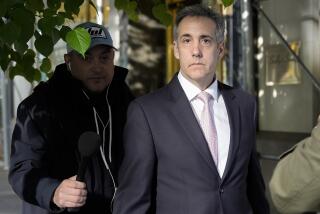Milken’s Former Boss May Testify : Securities: The one-time junk bond king may also take the stand next week.
- Share via
NEW YORK — Prosecutors said they expect to call former Drexel Burnham Lambert Chief Executive Frederick H. Joseph to testify Monday, after a day of hearings Friday in which government witnesses failed to back up allegations of bribery by Michael Milken.
Defense lawyer Arthur L. Liman also told a judge that Milken himself may testify during the coming week.
The pre-sentencing hearings are being held in federal court in New York to determine if Milken committed more crimes than the six he pleaded guilty to in April. He faces up to 28 years in prison.
In the latest phase of the hearings, prosecutors have focused on the leveraged buyout of Storer Communications in 1985 by Kohlberg Kravis Roberts & Co. The government contends that Milken secretly kept valuable Storer equity warrants for a Drexel employee partnership that he controlled. Prosecutors also charge that Milken used some of the warrants as personal bribes to mutual fund and investment company managers to get them to buy risky Storer preferred stock for their funds.
Equity warrants are the right to buy stock at a specified price within a specified time. The Storer warrants became extremely valuable shortly after the leveraged buyout closed.
Prosecution witness Terren Peizer, a former Drexel high-yield bond salesman who sat next to Milken in the firm’s Beverly Hills office, said he had no knowledge of the warrants being used as bribes.
Peizer said he had sold some of the warrants to David Solomon, the founder of Solomon Asset Management, an investment fund, at Milken’s suggestion. He said Milken had suggested selling the warrants as an “equity sweetener” to induce the firm to buy Storer preferred stock. But Peizer said he didn’t learn until well after the buyout was completed that Solomon had kept the warrants for himself rather than passing them on to his investors. He also said Solomon later told him that his investors knew he had received the warrants personally and didn’t object.
Under cross-examination by Liman, Peizer said he saw nothing improper about Milken’s suggestion to him to sell warrants to Solomon. “I didn’t construe it as Mike saying to me to offer David Solomon a personal bribe,” he said.
Earlier in his testimony, Peizer described Milken as “very involved” in nearly everything that went on in the Drexel junk bond office. He said staff members routinely kept Milken informed of nearly all developments. Defense lawyers have admitted that wrongdoing went on in the office, but claim that much of it went on without Milken’s knowledge or approval.
Theodore Ammon, a senior KKR official, testified that KKR agreed to issue the Storer warrants because Milken and others at Drexel had said that was the only way they could be sure of finding buyers for the other Storer securities. He said Milken personally also talked him into slashing the purchase price of the warrants in half, to 7 cents each from 14 cents.
Ammon said he was surprised to learn that the Milken partnership had kept the vast majority of the warrants for itself. He said he thought Drexel had acted improperly by not telling KKR that the partnership was keeping the warrants.
But under cross-examination, Ammon acknowledged that KKR had given Drexel wide discretion in what to do with the warrants and hadn’t specifically prohibited Drexel or its employees from buying them. He also said that KKR might well have gone ahead with the Storer deal even if it had known in advance that the partnership was keeping the warrants.
One of the lighter moments in the testimony came when Peizer described the atmosphere in the Beverly Hills office after it became known that admitted inside trader Ivan F. Boesky was cooperating with the government. Peizer said Milken asked him to turn over a book of records concerning David Solomon to Lorraine Spurge, one of Milken’s top assistants. He said he did so, but only after going into the department’s kitchenette and turning on a faucet while he spoke to Spurge.
He said he did so because it had become the thing to do in the office--staff members feared that the trading floor had been bugged by the government. “It just seemed like everyone was running faucets,” Peizer said.
More to Read
Inside the business of entertainment
The Wide Shot brings you news, analysis and insights on everything from streaming wars to production — and what it all means for the future.
You may occasionally receive promotional content from the Los Angeles Times.










